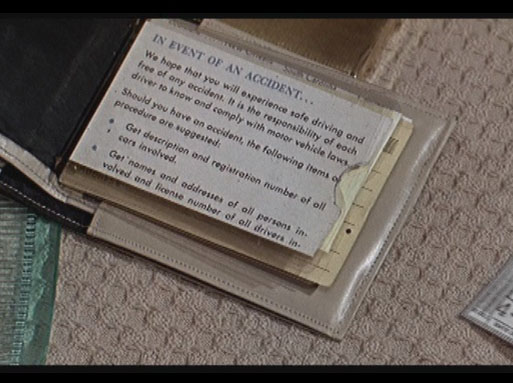- False Identities
- »Childhood
- Gender
- Preoedipal Other
Mother, Mother, I am Ill
Marnie's problems are plainly rooted in her childhood. We see hints at the impact of her childhood trauma as early as our introduction to her: as “Marion” opens her wallet to change her identity, an insurance card is exposed. “IN THE EVENT OF AN ACCIDENT,” it reads, before listing a number of steps which apply directly to the plot:

Marnie removes her false Social Security card from atop the insurance card. Taken as a loosely veiled metaphor, the card itself foreshadows the Freudian "talking cure" - in case of accident (accidental murder), get description of all cars (circumstances), then get the names and addresses of persons involved. Doing so, implies the card, will "fix" your accident - or your childhood psychological trauma, as the case may be.
Marnie’s first journey ends at her mother's home, where she engages in childlike games of jealousy with a neighbor girl some several years her younger. As she competes for her mother’s attention, her status as childlike is cemented.
As the plot progresses towards Marnie's final revelation, her childlike trappings become still more overt. In a shot of similarly vague setting as Scottie's famous 360-degree kiss with Judy in Vertigo, Marnie's penultimate flashback begins in what Wood and Smith describe as her childhood bed:
The shot begins in an unfamiliar setting, though it quickly gives way to a diagetically coherent setting in the Rutland house. Once again, Hitchcock is cleverly exploiting the medium to draw the viewer into direct empathy with Marnie's psychological state.